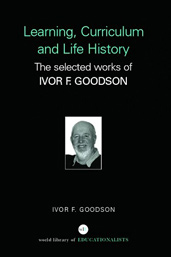Learning, Curriculum and Life Politics: the selected works of Ivor F. Goodson
Becoming a School Subject
The central problem therefore remained the establishment of departments in universities where geographers could be made and the piecemeal changes in pursuit of pupil relevance and utility could be partially controlled. To further this objective the Geographical Association began to promote more academic arguments for the subject. By this increasingly academic presentation of the school subject provided more pressure on the universities to respond to the demand for the training of geography specialists. As a recent president of the Geographical Association has noted, 'the recognition of our subject's status among university disciplines... could never have been achieved without remarkable stimulus and demand injected from out of schools'. The contention, whilst correct, contains the origins of the status problems geography has encountered in universities. As David Walker has noted, 'some senior members of our ancient universities can still be found who dismiss it as a school subject'. As a result until recently geographers remained a frustrated university profession because of what Wooldridge described as 'the widespread belief among our colleagues and associates that we lack academic status and intellectual respectability. What has been conceded is that geography has a limited use in its lower ranges. What is implicitly denied by so many is that it had any valid claim as a higher subject'.
Wooldridge hints, however, that acceptance at the lower level is the main threshold to cross: 'It has been conceded that if geography is to be taught in schools it must be learned in the universities'. The relevance of the school 'base' to university geography is well illustrated by St Catherine's College, Cambridge. The college has produced so many professors of geography for the country's universities that a conspiracy might be alleged. David Walker disagrees: 'In fact, to dispel the conspiracy, the reasons for this academic configuration are down to earth. St Catherine's was one of the first colleges to offer awards in geography: it established a network of contacts with sixth form teachers, many of whom later were its own graduates, and with particular schools like the Royal Grammar, Newcastle'. Walker points to the personal nature of subject induction. 'Since the Second World War, moreover, many of the St Catherine's geographers who went on to become professors, readers and lecturers who taught by one man, Mr A.A.L. Caeser, now the senior tutor'.
The period following 1945 does seem to have been critical in geography's acceptance and consolidation within the university sector. Professor Alice Garnett explained in 1968 why this period was so important: 'Not until after the Second World War was it widely the case that departments were directed by geographers who had themselves received formal training in the discipline, by which time most of the initial marked differences and contrasts in subject personality had been blurred or obliterated'. At this point geography departments were established in most universities and the subject had a recognizable core of identity. By 1954, Honeybone could write a summary of the final acceptance and establishment of geography as a university discipline:
In the universities, there has been an unparalleled advance in the number of staff and scope of the work in the departments of geography. In the University of London alone, there are now six chairs, four of them of relatively recent creation. Students, both graduates and undergraduates, are greater in number than ever before. Many of the training colleges and university departments of education are taking a full part in the progress; employers are realizing the value of the breadth of a university training in geography; and the Civil Service has recently raised the status of geography in its higher examinations. In fact, on all sides, we can see signs that, at long last, geography is forcing its complete acceptance as a major discipline in the universities, and that geographers are welcomed into commerce, industry and the professions, because they are well educated men and women...
- Garnett, A. (1969) 'Teaching geography: some reflections', Geography, 54, p. 387.
- Walker, D. (1975, November 28th) 'The well-rounded geographers', The Times Educational Supplement, p. 6.
- David, T. (1973) 'Against geography', in D. Bale, N. Grave and R. Walford (Eds) Perspectives in Geographical Education, Edinburgh, pp. 12-13.
- ibid.
- op. cit., Walker, p. 6.
- op. cit., Garnett, p. 368.
- Honeybone, R.C. (1954) 'Balance in geography and education', Geography, 34, No. 184.
